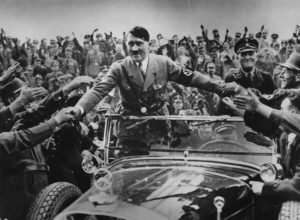Hitler: the economic element – Joe Buckley
Joe gives an interesting insight into Germany’s ‘economic boom’ post WWI and Hitler’s pivotal role in this, along with a cheeky jibe at a modern economic struggle.
When one thinks of the brutal regime that controlled Germany between the late 1930s and early 1940s, your first thoughts tend to be about the atrocities and oppression, not the economic miracle which the Nazis were able to achieve. Following the demoralising treaty signed by Germany, which marked the end of World War One (including the removal of many industrial regions such as the Saar Basin for reparations), it is fair to say that the German economic prospects were very bleak right from the start. Shortly afterwards, the economy suffered through both the Ruhr hyperinflation and of course, ‘The Wall Street Crash’. So how did the Nazis rebuild the broken and battered economy into one of the most stable and efficient economies at the time?
One of the key reasons for this is that it is down to the Führer, commonly known as Adolf Hitler. Despite racist rants and the oppression of many citizens, Hitlers charisma and actions were able to rally the people around him. Both the seizure of Czechoslovakia and the militarisation of the Ruhr were key examples of Hitler following through with his pledges to the people. This meant that the population worked much harder, believing they could create a better Germany together. This idea can be evidenced by the employment figures between 1932 (under the Weimar Republic) and 1938, which dropped from 30.1% to 2.1%. This meant that the country was nearing full employment of all its resources, something which is key for economic growth and development. Furthermore, due to the oppression of Trade Unions, the regime was able to stop wage inflation and therefore price inflation, creating even more stability in the country.

Investment was another mechanism by which the Nazis helped to create economic growth. One of the most notable examples was the expansive Autobahn system which covered much of Germany. This significantly increased government spending and therefore aggregate demand as well as expanding the productive capacity of the German economy in the long term. Low interest rates were also introduced to encourage German consumption and investment by firms as loans became cheaper. These all helped to give the sense of a growing economy created by geniuses who had very few resources at their disposal. But was the economy really growing at the rate the Nazis said it was?
Without a doubt! The significant increase in employment seemed very unlikely at the time as Germany was one of the worst hit countries due to the world-wide economic collapse. Yet, the Nazis were able to achieve it through government spending and the encouragement of business growth; what is surprising, however, is that despite this, living standards never significantly grew. This is largely due to the ever-increasing spending on the military budget through programmes such as ‘Guns before Butter’. As well as this, real wages dropped by roughly 25% between 1933 and 1938. This meant that the utility consumers were receiving for each wage was gradually shrinking. These are just some ideas that question whether the Nazis economic reforms were truly a ‘miracle’ for the economy.

In conclusion, however, it is important to note that, Shacht, among other Nazi economists were extremely successful to a large extent with their reforms, producing some amazing statistics and figures. However, there is a strong argument put forward as to whether all of these economic successes were truly worth the persecution of a significant proportion of the population and the oppression of most citizens who were not of the supposedly superior Aryan race.
Reading back over these findings, I see there is a sense of irony, which is fascinating; the fact is that an economic miracle would likely have never occurred had the economy not collapsed due to the effects of the Wall Street Crash and the Versailles Treaty. This is because without the crash, Hitler and the National Socialist Party would have never been elected were it not for the collapse and therefore, Germany would likely have continued to make economic mistakes under the provisional government, the Weimar Republic. This all leads to significant increases in debt (such as the Dawes Plan) and a low standard of living compared to the countries around it. Sounds a lot like Greece to me.
Joe Buckley
CWD – Y11















Post Comment
You must be logged in to post a comment.